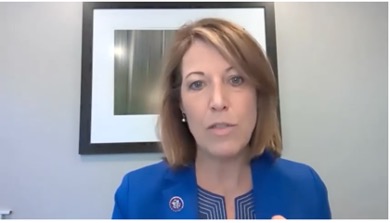One of the 11 Republican senators negotiating the final details of the bipartisan infrastructure package says it’s possible to have the bill text ready by the middle of the week. But Sen. Bill Cassidy, R-La., says Democrats aren’t being flexible enough when it comes to paying for the $579 billion in new spending.
“We need cooperation from the White House and Schumer on the pay-fors,” Cassidy told Fox News Sunday.
Keep in mind: Republicans ran into objections on their side of the aisle to using stepped-up tax enforcement to pay for the bill.
Sen. Rob Portman, R-Ohio, told CNN that the negotiations continued through the weekend.
Senate Majority Leader Charles Schumer, D-N.Y., is calling for the Senate to vote on the package Wednesday.
For more on this week’s policy agenda, read our Washington Week Ahead.

Rep. Cindy Axne
Key Democrat defends Biden tax plan
A moderate House Democrat who could be key to passing a $3.5 trillion spending package is vigorously defending President Biden’s plans to impose capital gains taxes at death. The proposal would effectively end the use of stepped-up basis.
Under Biden’s proposal, the tax on farm and small business assets would be deferred as long as the farms and businesses stay in operation, and Iowa Rep. Cindy Axne thinks that’s fair.
“The president has said he wants them (taxes on farms) deferred. Our job in Congress is to codify that language. I feel very confident that’s where we’re going,” Axne said in an Agri-Pulse Washington Week in Review interview.
Axne led a letter signed by 12 other rural House Democrats that raised concerns about the tax proposal in May
Keep in mind: Some farm groups are still concerned about the proposal because of the tax liability that would be attached to farms that pass to the next generation. Axne argues that the impact would be limited because of exemptions that total up to $2.5 million per couple. “It’s really just the wealthiest who might miss out a little bit,” she said.
House appropriators complete FY22 bills, Corps gets boost
The House Appropriations Committee has completed work on all 12 of its spending bills for fiscal 2022 after approving the Energy-Water and Transportation-HUD measures on Friday. The bills now go to the House floor. The Senate Appropriations Committee has yet to act on its FY22 bills.
The House Energy-Water bill includes $8.7 billion for the Army Corps of Engineers, an $863 million increase over FY21. The bill includes $22.5 million in construction funding for the Corps’ Navigation and Ecosystem Sustainability Program, which will rehabilitate the upper Mississippi River locks and dams.
“It is well known that the majority of the nation’s locks and dams have outlived their 50-year design life,” said Mike Seyfert, president and CEO of the National Grain and Feed Association. “As our infrastructure deteriorates, the U.S. falls further behind the competition in the global marketplace.”
WOTUS back in EPA’s hands, but Trump rule still in place
A federal judge in South Carolina has granted the government’s request to remand the Trump administration’s Navigable Waters Protection Rule to the EPA and the Army Corps of Engineers. That will allow those agencies to write a new definition of what streams and wetlands fall under the jurisdiction of the Clean Water Act.
But the one-page ruling by U.S. District Judge Bruce Howe Hendricks granted the government’s motion to leave the Trump rule in place while the revisions are in development. Environmental groups had asked him to vacate the rule.
EPA officials plan to hold listening sessions and a series of regional roundtables to gather input on the new definition.
Fresh questions for RFS after ruling
The latest major court ruling around the Renewable Fuel Standard will force EPA to consider the impact of biofuel production on endangered species. EPA could decide to reconsider and reduce the 2019 biofuel targets, but analysts with ClearView Energy Partners think the agency is more likely to leave them alone.
The bigger question coming out of the D.C. Circuit ruling is how the ruling will affect EPA’s decisions on future usage mandates. The ClearView analysts think EPA will use the ruling to limit future renewable volume obligations, or RVOs, “a move EPA is already considering on economic grounds,” they say.
Meat giant tightening animal welfare standards
Tyson Foods is implementing a new approach to animal welfare across its global operations.
The company says the new “five domains” approach is a “more progressive conceptual animal welfare framework” than the “five freedoms” framework Tyson had been using. Those five freedoms are “freedom from hunger and thirst; freedom from discomfort; freedom from pain, injury or disease; freedom to express normal behavior; and freedom from fear and distress.”
The new framework requires “the promotion of positive mental states through four domains – nutrition, physical environment, health and behavioral opportunities.” Addressing those areas “ultimately contribute to the fifth domain, the mental state of the animal,” Tyson said.
Dorothy McKeegan, senior lecturer in animal welfare and ethics at the University of Glasgow, says in a Tyson press release that the company is making an “admirable commitment to embrace animal welfare improvements in a scientifically sound, evidence-based way.”
Fresh water critical to food supply chain
USDA economists have done some calculations that illustrate the importance of fresh water to U.S. food production.
In 2012, the most recent year covered by the Economic Research Service study, it took 34 trillion gallons of fresh water to produce U.S. food and beverages, or about 30% of total U.S. water usage. That’s enough water to cover the state of California to a depth of one foot.
Over the period studied, water for food production peaked at 43 trillion gallons in 2002. (Ag water usage fluctuates based on precipitation.)
More than two-thirds of the water needed for food production is used for crop and livestock production. The rest is needed in other stages of the supply chain.
She said it. “You know the expression, ‘This is not my first rodeo.’ This is my first rodeo.” - House Appropriations Committee Chairwoman Rosa DeLauro, thanking panel members for their cooperation in advancing its FY22 spending bills. The Connecticut Democrat took over the committee this year.
Questions? Tips? Contact Philip Brasher at philip@agri-pulse.co




